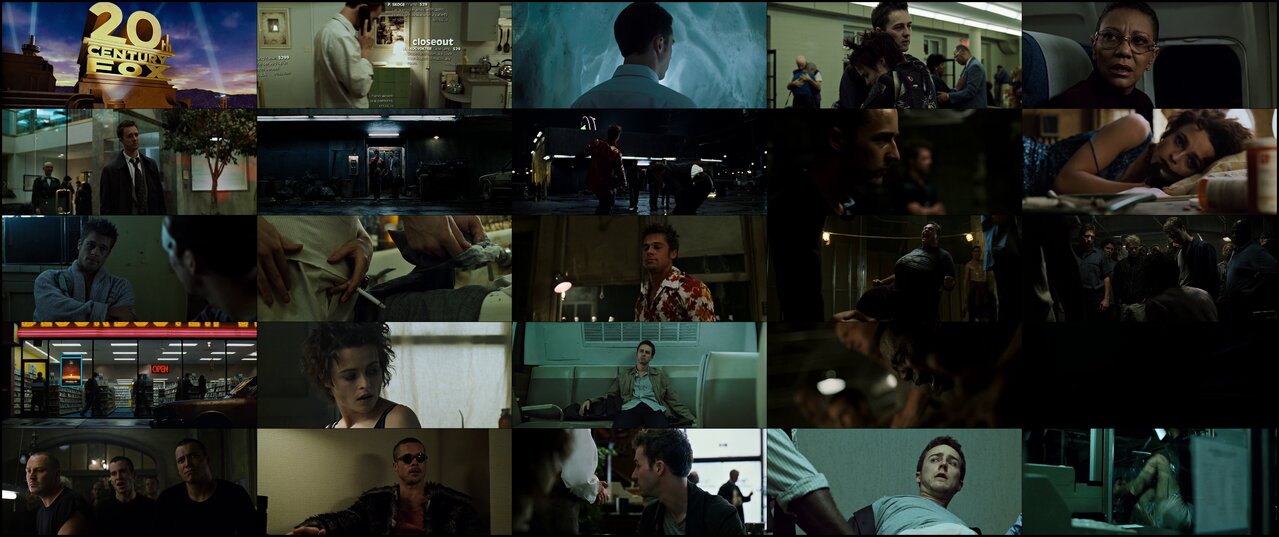Sunday, October 6, 2024
Fight Club (1999): A Deep Dive into Chaos, Identity, and Rebellion
"Fight Club" is one of those rare films that defines an era. Directed by David Fincher and based on Chuck Palahniuk's novel of the same name, this 1999 psychological thriller captured the raw angst of the late 20th century. It’s a movie that combines social commentary, existential dread, and raw masculinity in a way that is still talked about today.
Let's break down the layers that make "Fight Club" such a cultural phenomenon.
The Storyline: Madness Unleashed
At its core, "Fight Club" is a movie about an unnamed protagonist (played by Edward Norton) who feels trapped in his corporate, consumer-driven life. Suffering from chronic insomnia and an existential crisis, he attends support groups for various ailments, trying to feel something, anything.
Things take a dark turn when he meets Tyler Durden (Brad Pitt), a soap salesman with a philosophy centered on rejecting societal norms. Together, they form a secret club where men can beat each other senseless to reclaim their masculinity and escape the pressures of modern life. What starts as an underground brawl escalates into a full-blown anarchist movement, questioning the very fabric of reality.
Breaking Down the Characters
The Narrator (Edward Norton): He’s a man who feels suffocated by his mundane, consumer-driven existence. Despite his material success, he’s emotionally empty. The narrator's journey is a disturbing dive into his own psyche, exploring themes of identity, self-worth, and what it means to be truly alive.
Tyler Durden (Brad Pitt): Tyler is the embodiment of everything the narrator wants to be—free, rebellious, and charismatic. However, as the story progresses, it becomes clear that Tyler is more than just a rebellious figure. He’s a manifestation of the narrator's darkest desires and frustrations, pushing him toward complete anarchy.
Marla Singer (Helena Bonham Carter): Marla is the wild card in the mix. She’s chaotic, self-destructive, and lives without care for societal expectations. Her complicated relationship with the narrator and Tyler provides another layer of psychological tension in the film.
Themes: Consumerism, Identity, and Chaos
One of the most striking aspects of "Fight Club" is its commentary on consumerism. The movie's tagline, “The things you own end up owning you,” reflects the narrator’s frustration with the corporate, materialistic world. He collects furniture from Ikea, orders fancy clothes, and invests in a perfect condo—but none of it brings him joy. Tyler Durden’s philosophy encourages breaking free from this hamster wheel and embracing primal instincts instead.
Identity is another major theme. As the narrator gets deeper into the world of Fight Club, his sense of self begins to unravel. He questions who he is, what makes him happy, and how he fits into society. Without spoiling the ending for those who haven’t seen it, let’s just say that the twist plays into this theme in a mind-bending way.
Finally, chaos and anarchy underpin much of the film’s action. As Fight Club grows from an underground boxing ring to a full-fledged anti-corporate movement, the movie questions whether complete freedom from societal expectations leads to true liberation or just total destruction.
The Legacy: More Than Just Fists
Upon its release, "Fight Club" received mixed reviews. Critics were divided; some hailed it as a masterpiece, while others called it nihilistic and toxic. Over time, however, it has become a cult classic and is now considered one of the most influential films of the late 1990s.
The movie has spawned countless discussions, fan theories, and interpretations, with its iconic quotes like “I am Jack’s smirking revenge” and “You are not your job” becoming part of pop culture lexicon. It’s also frequently referenced in discussions about toxic masculinity, mental health, and rebellion against societal norms.
Visuals and Direction
David Fincher’s direction is top-notch, as always. The dark, gritty visual style perfectly complements the movie's themes of madness and rebellion. The fight scenes are brutal and realistic, without being glamorized, and the movie’s pace keeps you on edge, particularly as the tension between the narrator and Tyler escalates.
Fincher’s use of subliminal messages and fourth-wall-breaking techniques add to the unsettling, dreamlike quality of the film. There’s a constant sense of something lurking beneath the surface, something off-kilter that builds to an unforgettable climax.
Fight Club’s Cultural Impact
"Fight Club" became more than just a movie—it became a cultural movement. Its commentary on the emptiness of consumer culture resonated with a generation that was becoming increasingly disillusioned by corporate America. The idea of reclaiming one’s masculinity, of pushing back against a system that felt stifling, appealed to young men in particular.
However, it’s important to note that "Fight Club" is often misinterpreted. The movie’s message is not about glorifying violence or encouraging nihilism but rather about exploring the dangers of unchecked rebellion and self-destruction.
The Big Twist: Let’s Talk About It (Spoilers!)
We can’t discuss "Fight Club" without addressing the major plot twist—Tyler Durden is the narrator’s alter ego. Throughout the movie, the narrator is actually living out his darker, more chaotic desires through this imagined persona. This twist changes everything you thought you knew about the film and forces you to reevaluate earlier scenes.
This revelation underscores the film's exploration of identity, mental illness, and the fine line between liberation and destruction.
Conclusion: A Cult Classic That Still Packs a Punch
"Fight Club" remains a provocative, intense film that challenges its audience to question societal norms, materialism, and the very nature of self. It’s not an easy movie to digest, but that’s exactly what makes it so impactful. Whether you see it as a cautionary tale or a celebration of rebellion, one thing is for sure—it’s a movie that will leave you thinking long after the credits roll.
If you haven’t seen "Fight Club" yet, well, rule number one—don’t talk about it… just watch it!




